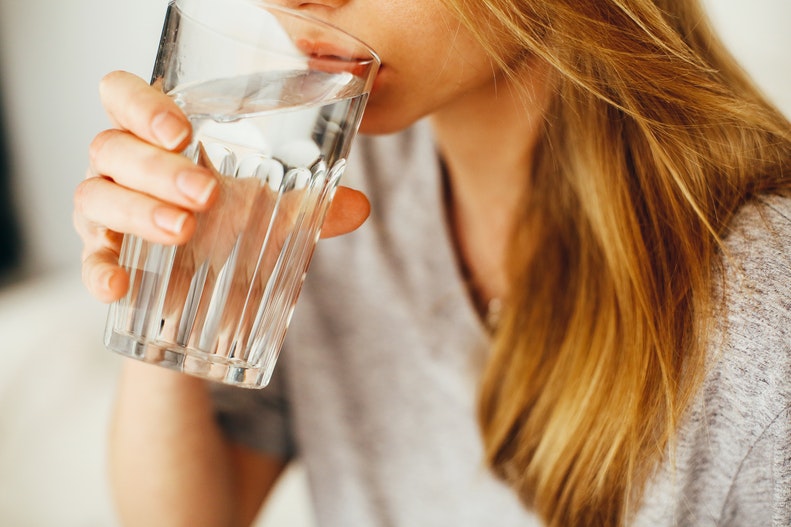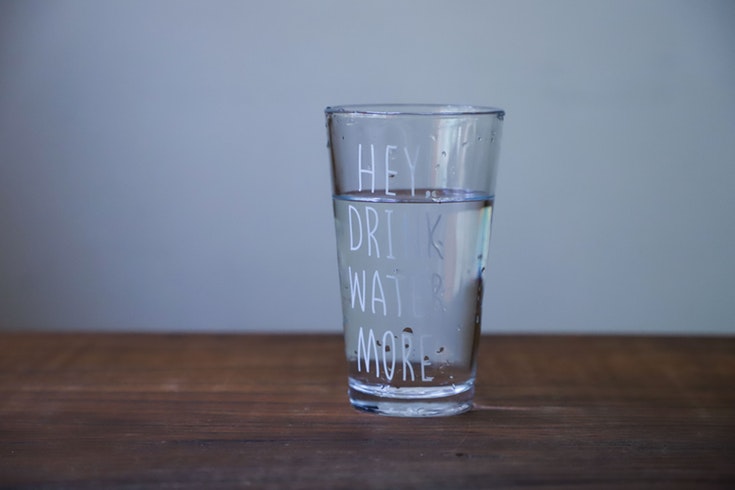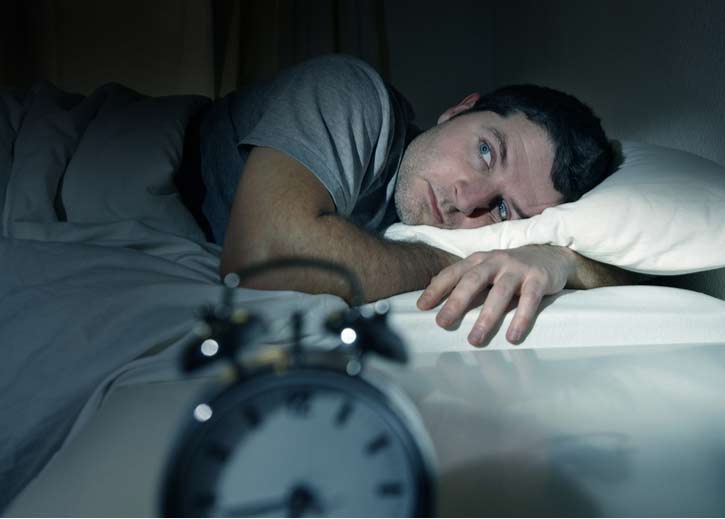Thirsty at bedtime but don’t want to wake up to use the bathroom in the middle of the night? Wondering if drinking a glass of water before bed will make you feel less groggy in the morning? We’ve got the answers for you.
Below, we’ll break down the pros and cons of drinking water before bed, explain the connection between dehydration and sleep, and tell you how much water you should drink at night.
Drinking Water Before Bed: Benefits and Risks
Drinking too much water at night can disrupt your sleep cycle. It can cause “nocturia,” which is what it’s called when you need to get up and go to the bathroom at night. Late night urination can lead to sleep deprivation, which can negatively impact your health. In fact, lack of sleep can weaken your immune system, worsen your mental health, and exacerbate conditions like high blood pressure, high cholesterol, and heart disease.

But drinking water throughout the day is important for your overall health. The Mayo Clinic says water helps regulate body temperature, protect organs and tissues, lubricate joints, and carry nutrients to cells. Some water intake before bed can be helpful for flushing out waste overnight, and it might make you more comfortable if you take medications that cause dry mouth.
| Benefits of Drinking Water Before Bed | Drawbacks of Drinking Water Before Bed |
| Drinking warm water before bed can improve digestion. | Drinking too much water before bed can wake you up in the middle of the night to use the restroom, which might prevent you from getting enough sleep. |
| Staying hydrated is important to overall wellness, and drinking a little bit of water before bed can prevent you from feeling tired when you wake up. | If you wake up often to use the restroom your sleep duration and sleep quality will be significantly worse, which can cause several adverse health effects. |
| If you have health conditions or take medication that causes dry mouth, drinking water before bed might help you feel more comfortable at night. | Drinking cold water before bed might negatively impact your digestion and worsen cold and flu symptoms. |
How Much Water Should You Drink Before Bed?
Drinking a small glass of water before bed (instead of an entire water bottle), is a good rule of thumb. Nobody likes to go to sleep thirsty, but too much fluid intake before bed can make it hard to stay asleep for the entire night.

Remember that you should drink a lot of water throughout the day to stay hydrated. The human body needs plenty of water to function properly. The Missouri System Clinic suggests drinking at least six glasses of water per day for proper hydration, though you should drink more if you exercise or sweat a lot in hot weather. Remember that eating foods like fruit, which have high water content, can also help you stay hydrated.
When To Stop Drinking Water Before Bed
According to the Cleveland Clinic, you should stop drinking water about two hours before bed. You’ll have a better night because you won’t disrupt your circadian rhythm with extra trips to the bathroom. The bottom line is that sleep disruptions like an overactive bladder can negatively impact your physical and mental health. If you have an underlying condition or take a diuretic, you should discuss your hydration levels and nighttime fluid intake with your doctor.
Dehydration and Sleep
Dehydration has many negative effects, including headache, dizziness, and confusion. But it can also make you feel tired throughout the day. Staying hydrated can help you get better sleep and make you feel less fatigued in general.
How Does Dehydration Affect Sleep?
Being dehydrated can not only negatively affect your health, but it can also keep you from getting enough restful sleep. A 2019 cross-cultural study suggests that adults who sleep fewer than the recommended eight hours per night are more likely to be dehydrated. Researchers found adults who reported sleeping six hours demonstrated a 16% to 59% higher likelihood of dehydration compared to those who reported sleeping eight hours consistently.
The link between lack of sleep and dehydration is caused by the release of a hormone called vasopressin, which is responsible for regulating your body’s hydration level. Vasopressin is released throughout the day and increases while you are in the later stages of sleep. Not getting enough sleep may shorten the window of time vasopressin is released, which may cause dehydration.

Signs of Dehydration
Not sure whether you’re getting enough water? Check out some common signs of dehydration below.
- Headache
- Dry mouth or feeling thirsty
- Feeling lightheaded or dizzy
- Feeling tired
- Decreased urine production
- Dark colored or strong-smelling urine
- Sunken eyes
Some symptoms of dehydration are also common cold or flu symptoms. If your cold is keeping you up at night, check out our How To Sleep When You’re Sick guide.
FAQs
How does dehydration affect sleep?
Dehydration can decrease melatonin production and make it harder for you to fall asleep or stay asleep.
Can drinking water help you sleep better?
Drinking water throughout the day can make it easier to fall asleep by helping your body produce melatonin and lowering your blood pressure, which can help you relax. Try to drink enough water throughout the day so that you don’t need to drink too much water right before bed.
Can you fall asleep while dehydrated?
Yes, you can still fall asleep while dehydrated. But you may wake up still feeling tired if you’re not drinking enough water throughout the day. You might also not be able to sleep for as long as you would be if you were hydrated.
What are the signs of severe dehydration?
Not urinating at all, not sweating, headache, dizziness, thirst and less skin elasticity can all be signs of severe dehydration. Be mindful of your water intake, especially in hot weather.

